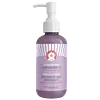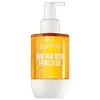What's inside
What's inside
 Key Ingredients
Key Ingredients

No key ingredients
 Benefits
Benefits

 Concerns
Concerns

 Ingredients Side-by-side
Ingredients Side-by-side

Caprylic/Capric Triglyceride
MaskingCitrus Aurantium Dulcis Peel Oil
MaskingLimonene
PerfumingCitrus Limon Peel Oil
MaskingCitrus Reticulata Peel Oil
MaskingMentha Viridis Leaf Oil
AstringentOrbignya Oleifera Seed Oil
EmollientHelianthus Annuus Seed Oil
EmollientOlea Europaea Fruit Oil
MaskingPrunus Armeniaca Kernel Oil
MaskingSimmondsia Chinensis Seed Oil
EmollientVitis Vinifera Seed Oil
EmollientBenzyl Alcohol
PerfumingCitral
PerfumingCitronellol
PerfumingFarnesol
PerfumingGeraniol
PerfumingLinalool
PerfumingCaprylic/Capric Triglyceride, Citrus Aurantium Dulcis Peel Oil, Limonene, Citrus Limon Peel Oil, Citrus Reticulata Peel Oil, Mentha Viridis Leaf Oil, Orbignya Oleifera Seed Oil, Helianthus Annuus Seed Oil, Olea Europaea Fruit Oil, Prunus Armeniaca Kernel Oil, Simmondsia Chinensis Seed Oil, Vitis Vinifera Seed Oil, Benzyl Alcohol, Citral, Citronellol, Farnesol, Geraniol, Linalool
Caprylic/Capric Triglyceride
MaskingHelianthus Annuus Seed Oil
EmollientOlea Europaea Fruit Oil
MaskingMacadamia Integrifolia Seed Oil
Skin ConditioningSimmondsia Chinensis Seed Oil
EmollientCocos Nucifera Oil
MaskingParfum
MaskingSqualane
EmollientPaullinia Cupana Fruit Extract
Skin ConditioningPtychopetalum Olacoides Bark/Root Extract
EmollientPlinia Cauliflora Fruit Extract
Skin ConditioningPlankton Extract
Skin ConditioningEuterpe Oleracea Fruit Oil
Skin ConditioningAmaranthus Caudatus Seed Extract
Skin ConditioningTriticum Vulgare Germ Extract
Skin ConditioningHordeum Distichon Extract
Skin ProtectingTocopherol
AntioxidantEthylhexylglycerin
Skin ConditioningBenzyl Alcohol
PerfumingBenzyl Salicylate
PerfumingCoumarin
PerfumingHydroxycitronellal
PerfumingLimonene
PerfumingLinalool
PerfumingBenzyl Benzoate
AntimicrobialCitral
PerfumingEugenol
PerfumingCaprylic/Capric Triglyceride, Helianthus Annuus Seed Oil, Olea Europaea Fruit Oil, Macadamia Integrifolia Seed Oil, Simmondsia Chinensis Seed Oil, Cocos Nucifera Oil, Parfum, Squalane, Paullinia Cupana Fruit Extract, Ptychopetalum Olacoides Bark/Root Extract, Plinia Cauliflora Fruit Extract, Plankton Extract, Euterpe Oleracea Fruit Oil, Amaranthus Caudatus Seed Extract, Triticum Vulgare Germ Extract, Hordeum Distichon Extract, Tocopherol, Ethylhexylglycerin, Benzyl Alcohol, Benzyl Salicylate, Coumarin, Hydroxycitronellal, Limonene, Linalool, Benzyl Benzoate, Citral, Eugenol
 Reviews
Reviews

Ingredients Explained
These ingredients are found in both products.
Ingredients higher up in an ingredient list are typically present in a larger amount.
Benzyl Alcohol is most commonly used as a preservative. It also has a subtle, sweet smell. Small amounts of Benzyl Alcohol is not irritating and safe to use in skincare products. Most Benzyl Alcohol is derived from fruits such as apricots.
Benzyl Alcohol has both antibacterial and antioxidant properties. These properties help lengthen the shelf life of products. Benzyl Alcohol is a solvent and helps dissolve other ingredients. It can also improve the texture and spreadability.
Alcohol comes in many different forms. Different types of alcohol will have different effects on skin. This ingredient is an astringent alcohol.
Using high concentrations of these alcohols are drying on the skin. They may strip away your skin's natural oils and even damage your skin barrier. Astringent alcohols may also irritate skin.
Other types of astringent alcohols include:
According to the National Rosacea Society based in the US, you should be mindful of products with these alcohols in the top half of ingredients.
Any type of sanitizing product will have high amounts of alcohol to help kill bacteria and viruses.
Learn more about Benzyl AlcoholThis ingredient is an emollient, solvent, and texture enhancer. It is considered a skin-softener by helping the skin prevent moisture loss.
It helps thicken a product's formula and makes it easier to spread by dissolving clumping compounds.
Caprylic Triglyceride is made by combining glycerin with coconut oil, forming a clear liquid.
While there is an assumption Caprylic Triglyceride can clog pores due to it being derived from coconut oil, there is no research supporting this.
Learn more about Caprylic/Capric TriglycerideCitral is a fragrance and used to add a lemon-like scent to products. It is both naturally found in plants and created synthetically. In plants, it is commonly occurring in lemon myrtle, lemongrass, lemon tea-tree, lemon verbena, and other citruses.
The EU mandates Citral be listed separately as a fragrance. It is a known allergen and may cause contact dermatitis. Citral can also used as a masking ingredient.
The term 'fragrance' is not regulated in many countries. In many cases, it is up to the brand to define this term. For instance, many brands choose to label themselves as "fragrance-free" because they are not using synthetic fragrances. However, their products may still contain ingredients such as essential oils that are considered a fragrance.
The term 'citral' is a collective term for two geometric isomers: geranial/Citral A and neral/Citral B.
Learn more about CitralHelianthus Annuus Seed Oil is the oil derived from the seeds of a Sunflower. Sunflower seed oil is non-fragrant. It is an emollient, meaning it helps to soften the skin.
Sunflower seed oil contains many fatty acids. The fatty acids found in sunflower seeds include (from highest amount to least): linoleic acid, myristic acid, palmitic acid, stearic acid, arachidic acid, oleic acid, and linolenic acid.
These fatty acids help the skin create ceramides. Ceramides play a role in repairing the skin barrier.
Helianthus Annuus Seed Oil helps moisturize the skin. This in turn helps the skin look more rejuvenated and smoother.
Sunflowers are rich in vitamin E.
Historians believe Indigenous cultures of North America domesticated sunflowers before corn. Thus they relied on sunflower oil for a variety of uses. One such use is moisturizing skin and hair.
Sunflower seed oil may not be fungal acne safe. We recommend speaking with a professional if you have any concerns.
Learn more about Helianthus Annuus Seed OilLimonene is a fragrance that adds scent and taste to a formulation.
It's found in the peel oil of citrus fruits and other plants such as lavender and eucalyptus. The scent of limonene is generally described as "sweet citrus".
Limonene acts as an antioxidant, meaning it helps neutralize free radicals.
When exposed to air, oxidized limonene may sensitize the skin. Because of this, limonene is often avoided by people with sensitive skin.
The term 'fragrance' is not regulated in many countries. In many cases, it is up to the brand to define this term. For instance, many brands choose to label themselves as "fragrance-free" because they are not using synthetic fragrances. However, their products may still contain ingredients such as essential oils that are considered a fragrance.
Learn more about LimoneneLinalool is a fragrance and helps add scent to products. It's derived from common plants such as cinnamon, mint, citrus, and lavender.
Like Limonene, this ingredient oxidizes when exposed to air. Oxidized linalool can cause allergies and skin sensitivity.
This ingredient has a scent that is floral, spicy tropical, and citrus-like.
Learn more about LinaloolOlea Europaea Fruit Oil is the fixed oil obtained from the ripe fruit of the Olive. In other words - olive oil.
The primary contents of olive oil are glycerides of the fatty acids linoleic, oleic and palmitic.
Olive oil also contains antioxidants such as Vitamin E. Antioxidants may help reduce signs of aging by fighting unstable free-radical molecules. It also contains Vitamins A (retinol), D, and K.
The squalene in olive oil makes it a great emollient. Emollients help soothe and soften your skin by trapping moisture in. This makes olive oil a great skin moisturizer.
Studies show olive oil to have antibacterial and antifungal properties in low concentrations. Another study found olive oil irritated sensitive oily skin. We always recommend speaking with a professional about using this ingredient in your routine.
Due to the fatty acid content, this ingredient may not be fungal-acne safe.
Learn more about Olea Europaea Fruit OilThis oil comes from the seeds of the desert shrub called Jojoba. It is more commonly known as jojoba oil, a non-comedogenic oil.
Jojoba oil does not contain fragrance and has many fatty-acids, making it a great soothing ingredient.
It also contains Vitamin E, a great moisturizing ingredient. Vitamin E is also an antioxidant and protects your skin against oxidative damage.
This ingredient humectant properties, meaning it helps draw moisture from the air. This helps keep your skin hydrated.
While jojoba has antibacterial properties, it is only able to kill some strains of bacteria.
Studies also show it helps in wound healing. In fact, Indigenous cultures have used jojoba as a moisturizer and to help treat burns for centuries.
Fun fact: Jojoba oil similar to natural human skin sebum, so it has a great effect on dry skin. It is also promising with helping to regulate sebum production.
Due to its fatty acid content, Jojoba oil may not be fungal acne safe. We recommend speaking with a professional if you have any concerns.
Learn more about Simmondsia Chinensis Seed Oil